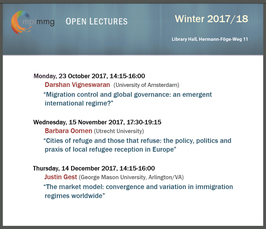"Migration control and global governance: an emergent international regime?"
Open Lectures Winter 2017/18
- Date: Oct 23, 2017
- Time: 02:15 PM - 04:00 PM (Local Time Germany)
- Speaker: Darshan Vigneswaran (University of Amsterdam)
- Darshan Vigneswaran is the Co-Director of the Institute for Migration and Ethnic Studies and Assistant Professor at the Department of Political Science, University of Amsterdam.
- Location: MPI-MMG, Hermann-Föge-Weg 11, Göttingen
- Room: Library Hall

For more details please contact buethe(at)mmg.mpg.de.
We are in the midst of an enduring global migration crisis. This is not a crisis facing governments but a crisis of governance: consisting of a growing gap between rising expectations that governments should control migrants and the persistent reality of large scale informal migration. This crisis demands a working international migration regime. Unfortunately, we can’t begin to build such a regime because we don’t know if one already exists, and if so, how it works. Is there an international migration control regime? How does it work? What reforms might help build a regime that could resolve the crisis?
The biggest unresolved puzzles facing our efforts to understand the nature, status and extent of an international migration control regime lie in the Global South. We know that the receiving states in the global north share common interests vis-a-vis migration, and commonly work together towards common ends. Migrant states have few incentives to control migration, yet they often do. We do not know why. More specifically, we have yet to explain why collaboration on international migration control a) began in the Global South - parts of the world that have rarely produced ideals of legitimate state practice; b) spread across the world in the absence of an international migration organization that could call recalcitrant states to account; and c) remains strong in countries where the state has generally lacked the capacity to serve basic functions. This talk will outline my preliminary efforts to resolve these puzzles, and thereby provide a better account of the nature, status and future of the international migration control regime.